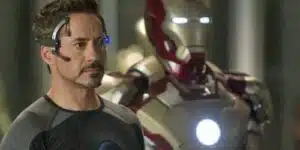
“I am Iron Man.” If you’ve heard Tony Stark (Robert Downey Jr.) say it once, you’ve heard it a thousand times. A pithy summary of Tony’s existential drama, the line underlines at once his internal split and his overweening ego, his reconciliation with the sentient armor and his resentment of it, the devastating bodily damage that led to his invention and the obligation it has come to represent.
In Iron Man 3, the line again comes at film’s end, preceded by and linked to another line, at the start: “A famous man once said, ‘We create our own demons.'” As soon as he says it, Tony backtracks, claiming he’s not sure who said it, and moreover, he’s going to start again. And with that, the movie zips back to 1999, before Tony went to Afghanistan, before he almost died, and before he created Iron Man. Even as you can imagine how Iron Man will be one of those demons, the film provides another, very obvious one, a nerd named Aldrich Killian (Guy Pearce), hoping to pitch an idea to the already famous Tony Stark. As they face one another, in an elevator no less, Killian can’t compete with the current object of playboy Tony’s interest, a brilliant and of course beautiful botanist named Maya (Rebecca Hall), and so, finds himself summarily banished.
That Killian will become Tony’s demon is foregone, that he will do so by creating yet another demon is at least nominally clever. The film makes a rudimentary case concerning the consequences of arrogance, ignorance, and violence, whether enacted by individuals, corporations or governments, with both Maya and Killian left feeling aggrieved.
That these feelings lead to the development of a technology that’s at least vaguely related to Tony’s own Iron Man business is also not surprising, as such plots tend to be replicated in the Marvel universe. Here the technology is the Extremis virus, a biological process, achieved first in plants, with a “glitch,” demonstrated for Tony during that night in 1999 in Maya’s hotel room. She hopes the virus will be regenerative, that it will reverse damage to organisms (cf, Tony’s own eventual invention), and she doesn’t foresee that the glitch will become the use to which Extremis is put by, yes, extremists.
Just as this nightmare version of Extremis shows up in Iron Man 3‘s present day, turning those who are infected with it into addicts and then human bombs, Tony is re-re-introduced in that present day, suffering from more sleeplessness than usual. And just as he’s complaining about it to Pepper (Gwyneth Paltrow) and also spending his nights in the lab-basement with Jarvis (voiced by Paul Bettany), he appears duly beset, twitchy, agitated, big-eyed. He surrounds himself with himself, that is, multiple suits that manifest his pursuit of perfection and also his doubts. When one of these suits makes its way into he bedroom he shares with Pepper, threatening her as she is trying to wake Tony out of a nightmare, she advises that he re-sort his priorities.
He does not, opting instead to bring his nightmare into daytime, by picking a fight with the terrorist du jour, the Mandarin (Ben Kingsley). Exotic and brutal in a way that makes his death-to-the-infidels videos into tabloidy news, the Mandarin sets in motion a series of attacks, including one on Tony’s own home, separating him from Pepper and sending him forth (with one of his power-depleted suits) on yet another journey. This dark-night-of-the-soul sort of venture is marked by a trek through Tennessee backwoods and an encounter with a very helpful, very cute (apparently parentless) little nerd boy, Harley (Ty Simpkins). As Tony faces down his personal demons, he spends a few minutes pondering the demons haunting Harley’s small town, literally revealed here as atomic-bombish shadows on a wall where a war veteran blew himself up and also killed five civilians.
Again with the multiplicity. And so: the plot repeats, too: Tony tracks down the Mandarin, confronts Killian, aligns (again) with Rhodey, whose own other suit-self is repurposed and so renamed this time, War Machine being a bit too “aggressive.” Now called Iron Patriot, Rhodey’s suit is actually hijacked by the bad guys. It’s a minor problem, one that Tony’s suits resolve with lots of noisy explosions, but it points to a couple of themes the film doesn’t resolve.
For one thing, the government-issue suit is hijackable, suggesting the superiority of Tony’s DNA coding technology: he makes his suits for him, and also for Pepper, who becomes a weapon like Iron Man when she’s inside one. And for another thing, the suits, whether used by hijackers or by Tony as his own private army (see: Blackwater) work here a lot like drones. Even as they save Tony’s day, the suits pose a broader ethical question, concerning the unanticipated effects of unmanned weapons; unmanned on one end, their costs are always human.
Even if Tony, so committed to self-control even when he seems most utterly incapable of it, accomplishes his mission, the specter of the many suits remains. “I am Iron Man,” Tony says again, at the end of another Iron Man movie. It’s an identity and an idea, elusive and exaggerated, and never quite so predictable or as singular as you might imagine.

